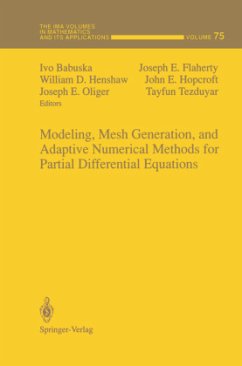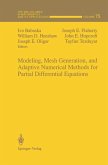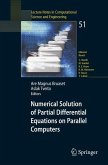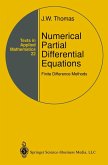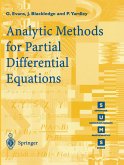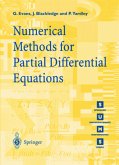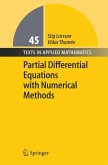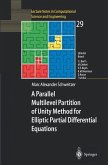With considerations such as complex-dimensional geometries and nonlinearity, the computational solution of partial differential systems has become so involved that it is important to automate decisions that have been normally left to the individual. This book covers such decisions: 1) mesh generation with links to the software generating the domain geometry, 2) solution accuracy and reliability with mesh selection linked to solution generation. This book is suited for mathematicians, computer scientists and engineers and is intended to encourage interdisciplinary interaction between the diverse groups.
This IMA Volume in Mathematics and its Applications MODELING, MESH GENERATION, AND ADAPTIVE NUMERICAL METHODS FOR PARTIAL DIFFERENTIAL EQUATIONS is based on the proceedings of the 1993 IMA Summer Program "Modeling, Mesh Generation, and Adaptive Numerical Methods for Partial Differential Equations." We thank Ivo Babuska, Joseph E. Flaherty, William D. Hen shaw, John E. Hopcroft, Joseph E. Oliger, and Tayfun Tezduyar for orga nizing the workshop and editing the proceedings. We also take this oppor tunity to thank those agencies whose financial support made the summer program possible: the National Science Foundation (NSF), the Army Re search Office (ARO) the Department of Energy (DOE), the Minnesota Su percomputer Institute (MSI), and the Army High Performance Computing Research Center (AHPCRC). A vner Friedman Willard Miller, Jr. xiii PREFACE Mesh generation is one of the most time consuming aspects of com putational solutions of problems involving partial differential equations. It is, furthermore, no longer acceptable to compute solutions without proper verification that specified accuracy criteria are being satisfied. Mesh gen eration must be related to the solution through computable estimates of discretization errors. Thus, an iterative process of alternate mesh and so lution generation evolves in an adaptive manner with the end result that the solution is computed to prescribed specifications in an optimal, or at least efficient, manner. While mesh generation and adaptive strategies are becoming available, major computational challenges remain. One, in particular, involves moving boundaries and interfaces, such as free-surface flows and fluid-structure interactions.
This IMA Volume in Mathematics and its Applications MODELING, MESH GENERATION, AND ADAPTIVE NUMERICAL METHODS FOR PARTIAL DIFFERENTIAL EQUATIONS is based on the proceedings of the 1993 IMA Summer Program "Modeling, Mesh Generation, and Adaptive Numerical Methods for Partial Differential Equations." We thank Ivo Babuska, Joseph E. Flaherty, William D. Hen shaw, John E. Hopcroft, Joseph E. Oliger, and Tayfun Tezduyar for orga nizing the workshop and editing the proceedings. We also take this oppor tunity to thank those agencies whose financial support made the summer program possible: the National Science Foundation (NSF), the Army Re search Office (ARO) the Department of Energy (DOE), the Minnesota Su percomputer Institute (MSI), and the Army High Performance Computing Research Center (AHPCRC). A vner Friedman Willard Miller, Jr. xiii PREFACE Mesh generation is one of the most time consuming aspects of com putational solutions of problems involving partial differential equations. It is, furthermore, no longer acceptable to compute solutions without proper verification that specified accuracy criteria are being satisfied. Mesh gen eration must be related to the solution through computable estimates of discretization errors. Thus, an iterative process of alternate mesh and so lution generation evolves in an adaptive manner with the end result that the solution is computed to prescribed specifications in an optimal, or at least efficient, manner. While mesh generation and adaptive strategies are becoming available, major computational challenges remain. One, in particular, involves moving boundaries and interfaces, such as free-surface flows and fluid-structure interactions.

